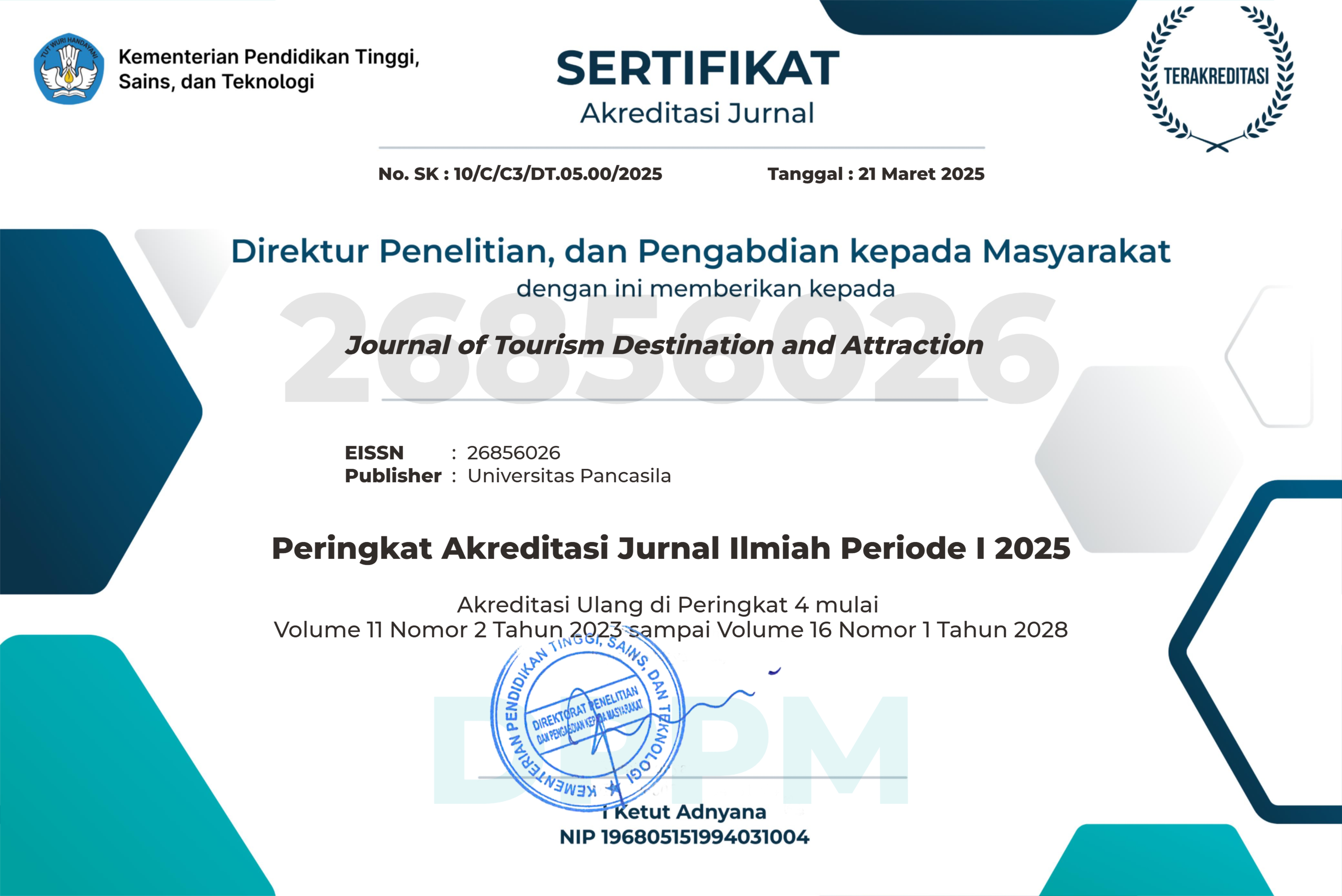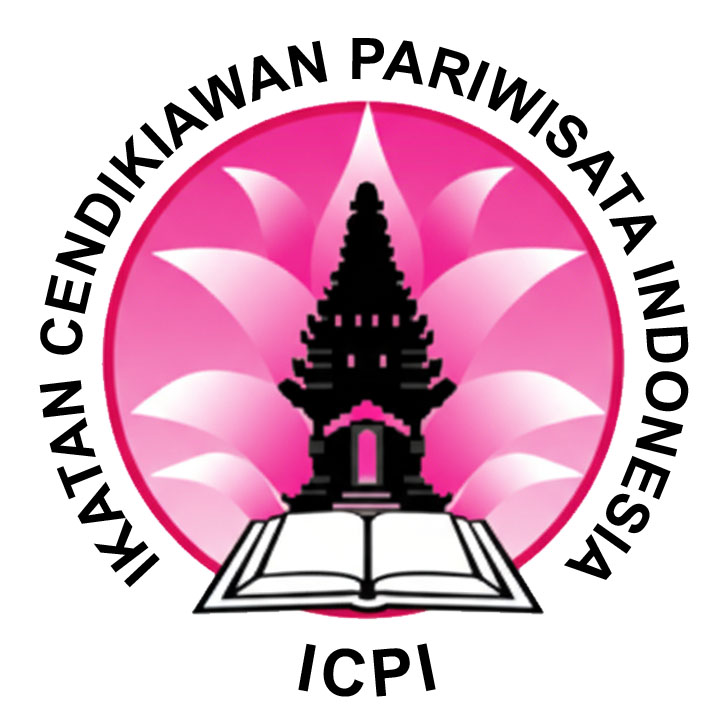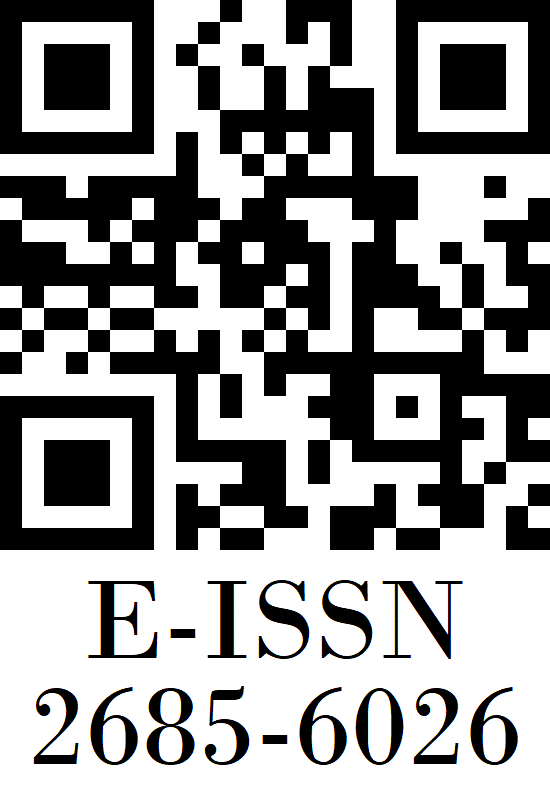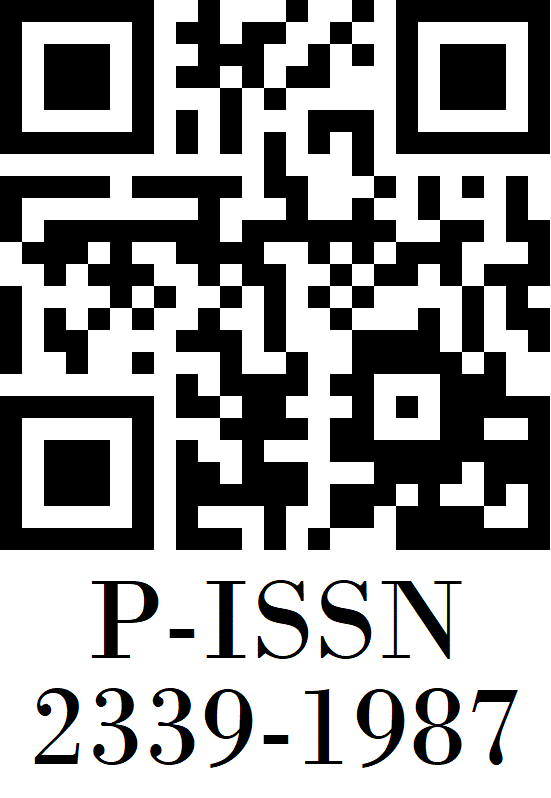BEHAVIORAL INTENTION OF Z GENERATION
Survey on Tourist Experience of Z Generation Visited Destination of Puncak Bogor
DOI:
https://doi.org/10.35814/tourism.v11i2.5955Keywords:
Tourist Experience; Behavioral Intention; Z GenerationAbstract
Generation Z's contribution in increasing tourist visits to Indonesia plays an important role. One of the tourist destinations frequently visited by Generation Z tourists in Indonesia is Puncak Bogor tourist destination. This study aims to identify the tourist experience and behavioral intention, and then analyze the influence of tourist experience dimensions toward behavioral intention in generation Z tourists who visit Puncak. This study uses a quantitative method with a descriptive verification approach and multiple linear regression analysis. The results of this study show that the escapism sub-variable is more prominent in the tourist experience of generation Z tourists because they get a pleasant experience that is different from their daily routine. Meanwhile, repurchase intention or willingness to return to Puncak is highest on the behavioral intention of generation Z tourists because of the satisfaction with the beauty of the destination. Furthermore, the results of multiple linear regression analysis describe that only the escapism sub-variable and the esthetic sub-variable had partially significant effect on the behavioral intention of generation Z tourists. Otherwise, the education sub-variable and the entertainment sub-variable have no effect on behavioral intention. These are due to the difficulty of getting skills improvement in tourism activities at destination, and provision of entertainment dimension that is relatively common for generation Z tourists.
References
Anggono AJ, dan Sunarti S. 2018. Pengaruh Harga dan Word of Mouth terhadap Keputusan Berkunjung (Survei pada Pengunjung Wisata Paralayang, Kota Batu). Jurnal Administrasi Bisnis, 61(3), 190-197.
Candra Y, dan Zulbahri L. 2018. Pengaruh Perceived Value dan Fasilitas terhadap Repurchase Intention Wisatawan di Objek Wisata Gunung Padang. Manajemen dan Kewirausahaan, 9 (3), 56-69.
Febryanti N. 2017. Pengaruh Tourist Experience terhadap Behavoral Intention Wisatawan di Desa Wisata Lebakmuncang Kabupaten Bandung [skripsi]. Bandung (ID): Universitas Pendidikan Indonesia.
Ferianto A. 2020. Pengaruh Destination Image, Perceived Value dan Service Convenience terhadap Behavioral Intention melalui Satisfaction (Studi Pada Pengunjung Objek Wisata Sri Gunung Kabupaten Batang) [skripsi]. Semarang (ID): Universitas Negeri Semarang.
Haddouche H, dan Salomone C. 2018. Generation Z and the tourist experience: tourist stories and use of social networks. Journal of Tourism Futures.
Liliani H. 2018. Motivasi dan Perilaku Penggunaan Media SosialGenerasi Z dalam Melakukan Perjalanan Wisata. Ultimacomm: Jurnal Ilmu Komunikasi, 10(1), 23-32.
Musa G, Mohammad I, Thirumoorthi T, Moghavvemi S, dan Kasim A. 2015. Exploring visitors’ experience using strategic experiential modules (SEMs): the case of Zoo Negara, Kuala Lumpur. International Journal of Tourism Cities.
Pine BJ II, dan Gilmore JH. 2011. The Experience Economy. Boston (US): Harvard Business School Press.
Pitana IG, dan Surya DIK. 2009. Pengantar Ilmu Pariwisata.
Yogyakarta (ID): Penerbit Andi.
Pitana IG, dan Gayatri PG. 2005. Sosiologi Pariwisata. Yogyakarta (ID): Penerbit Andi.
Pujiastuti EE, Hadi L, dan Zahro SA. 2020. Analisis faktor yang mempengaruhi behavior intention (studi pada wisatawan di objek wisata Puthuk Setumbu Borobudur). Jurnal Administrasi Bisnis, 9(1), 55-70.
Rahmi M, Andari R, dan Yuniawati Y. 2016. Pengaruh customer experience terhadap behavioral intention wisatawan di Saung Angklung Udjo (Survey terhadap wisatawan nusantara yang berkunjung ke Saung Angklung Udjo). Tourism and Hospitality Essentials Journal, 6(2), 1033-1040.
Ramukumba T. 2018. Tourists revisit intentions based on purpose of visit and preference of the destination: A case study of Tsitsikamma National Park. African Journal of Hospitality, Tourism and Leisure, 7(1), 1–10.
Robinson VM, dan Schänzel HA. 2019. A tourism inflex: Generation Z travel experiences. Journal of Tourism Futures.
Setiawan B, Trisdyani NLP, Adnyana PP, Adnyana IN, Wiweka K, dan Wulandani HR. 2018. The profile and behaviour of ‘digital tourists’ when making decisions concerning travelling case study: Generation Z in South Jakarta. Advances in research, 1-13.
Setiyariski R, Syarifuddin D, dan Kristiutami YP. 2019. Membangun Nilai Behavioral Intention melalui Tourist Experience. Media Wisata, 17(1), 25-34.
Slivar I, Aleric D, dan Dolenec S. 2019. Leisure travel behavior of generation Y & Z at the destination and post-purchase. E-Journal of Tourism, 147-159.
Suaedi S. 2011. Analisis Situasi Pariwisata Kawasan Puncak. Dinamika, 2(2).
Subekti D. 2020. Pengaruh Dimensi Customer Experience dan Kepercayaan terhadap Minat Berkunjung Kembali pada Pengunjung Dira Kencong Jember [skripsi]. Jember (ID): Universitas Jember.
Sugiyono. 2014. Metode Penelitian Kuantitatif, Kualitatif dan R&D. Bandung (ID): Alfabeta CV.
Yoeti OA. 2006. Perencanaan dan Pengembangan Pariwisata. Jakarta (ID): Penerbit Pradnya Paramita.
Yuniawati Y, dan Finardi ADI. 2016. Pengaruh customer experience terhadap revisit intention di taman wisata alam gunung Tangkuban Perahu. THE Journal: Tourism and Hospitality Essentials Journal, 6(1), 983-994.
Sumber Berita:
Bayu DJ. 2021 Jan 30. Indonesia Didominasi Milenial dan Generasi Z. Katadata.co.id. [Intenet]. [diakses 2021 Mar 17]. Tersedia pada: https://katadata.co.id/ariayudhistira/infografik/6014cb89a6eb7/indonesia-didominasi-milenial-dan-generasi-z


























